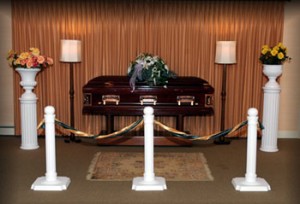My post “Death Etiquette: Pay Your Respects, Even If They Hate You” got a lot of response — all of it disagreeing with me. All who commented made good points, but some details require clarification.
Mood music:
[spotify:track:4hlPMJPtAZuwiDvkTNcBmX]
My point in that post was that if someone you love dies and someone else tells you not to attend the memorial services, they are being selfish and you need to do what you feel is right to honor the dead. Here’s what a few close friends said in response on my Facebook page (with my responses included):
Ken White: If someone closer to the deceased specifically does not want you there, I think it rude to go anyway. You can say goodbye in your own way. The dead will not be insulted and I see no reason for you to upset someone during such an upsetting situation just so you can feel better about “paying your respects.” In your case, no one specifically asked you not to attend, so I think you are correct. In the other case, she could call the ex-mother-in-law directly and ask. If she can’t summon the courage to ask for permission, then she shouldn’t be at the wake/funeral.
Paul Bowen: Send flowers if you think folks don’t want you there but you want to pay your respects. Wakes are for the living not the dead.
Me: I think that is a good point in regards to the wake. But the funeral is all about the dead and a person should be able to go and sit at the back of the church, temple etc.
Ken: Bill, it’s not about you. It’s a family thing, and if you are guaranteed to cause a problem, well, I just think it is selfish.
Some clarifications:
I agree the wake is a family thing, and that if you’re not family you should probably just send flowers. I also agree that if someone is a loose cannon around certain people, they should stay away. Nobody should go to a wake or funeral knowing that they will cause mayhem.
But the person I wrote about was part of that family and was close to the deceased. Telling her to stay away is selfish, too (selfishness can go both ways). I do agree with everyone commenting that a good middle ground is to skip the wake and go to the funeral, hanging at the back of the church. The person I wrote about is being discouraged from doing even that, and since it’s family, I think that’s unfair.
I also should have been clearer about the wake vs. funeral. It seems that readers thought I was talking mostly about the wake, and that since wakes are for the living more than the dead my arguments are invalid.
But I was talking about the funeral as much as the wake. Unless the obituary calls it a private service, anyone should be able to go and sit in the back of the church. Wakes are another matter. I agree that if you know you will cause a problem, you should stay away. But then this post wasn’t directed at the loose cannons. It was directed toward reasonable people who never willingly inject chaos into a wake.
I also think people missed the full picture in the example I gave. That’s because I held back a lot of detail to preserve the anonymity of those involved. In doing so, I didn’t give you a clear picture of where the dysfunctional family fault lines are.
It’s hard to give an informed opinion when you’re not fully informed.
At the end of the day, I think this is a useful discussion to have if it helps us conduct ourselves better going forward.


